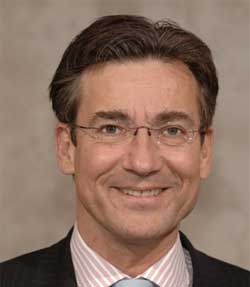
The Dutch Minister of Foreign Affairs has summoned the Papal Nuncio to the Netherlands to the ministry and expressed objections to the approach the Holy See took at the UN over a statement on the human rights of gays.
Maxime Verhagen, who is a Christian Democrat, told Monsignor François Bacqué that the Pope's recent claim that homosexuality is as great a threat to humanity as the destruction of the rainforest was not constructive.
The minister also said he was surprised at the negative approach the Holy See took at the UN initiative, which the Netherlands backed.
66 nations supported the statement on LGBT rights at a session of the United Nations General Assembly in New York last month.
It was read out by Argentina's Ambassador the UN.
It does not create new rights and is not legally binding but instead builds on similar past initiatives.
It affirms the principle of universality: that all human beings, irrespective of their sexual orientation or gender identity, are entitled to equal dignity and respect.
The Roman Catholic Church's representative at the United Nations, Archbishop Celestino Migliore, said the Vatican opposed the use of the phrases "gender identity" and "sexual orientation" in the statement as they have no definition in international law and are cultural concepts.
"The Holy See appreciates the attempts made to condemn all forms of violence against homosexual persons as well as urge states to take necessary measures to put an end to all criminal penalties against them," he said.
The Chuch claims that the statement: "goes beyond this goal and instead gives rise to uncertainty in the law and challenges existing human rights norms."
Despite the fact the statement is not legally binding, the Vatican claims it "would create serious uncertainty in the law as well as undermine the ability of states to enter into and enforce new and existing human-rights conventions and standards."
No comments:
Post a Comment